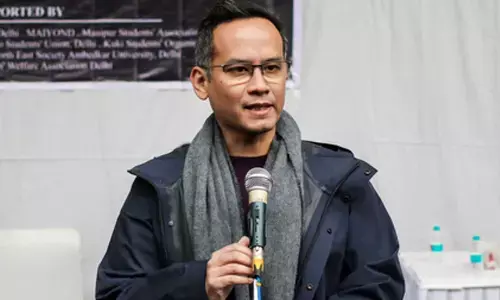Harping on non-issues

Harping On Non-Issues. Akhilesh, the new chief minister and Yadav’s son, went on a bonanza of distributing laptops among the school-going students in the State – obviously having a better sense of understanding the mood of the people.
Akhilesh, the new chief minister and Yadav’s son, went on a bonanza of distributing laptops among the school-going students in the State – obviously having a better sense of understanding the mood of the people. Over the decade, there has been a perceptible change in the social and educational climate of UP, and it looked as if the State was set to be going through a phase of a virtual English renaissance.
 It is easier calling up old ghosts but difficult sending them back home–a refrain by a French poet which home-spun Samajwadi Party supremo Mulayam Singh Yadav wouldn’t perhaps be aware but this is what exactly he did when he called for scrapping English from the proceedings of Parliament. Yet, it is an intriguing remark on his part, for, it is not clear whether he wanted the bar to apply and remain confined to Parliament alone or would he like it to be gradually extended to other spheres of democratic governance.
It is easier calling up old ghosts but difficult sending them back home–a refrain by a French poet which home-spun Samajwadi Party supremo Mulayam Singh Yadav wouldn’t perhaps be aware but this is what exactly he did when he called for scrapping English from the proceedings of Parliament. Yet, it is an intriguing remark on his part, for, it is not clear whether he wanted the bar to apply and remain confined to Parliament alone or would he like it to be gradually extended to other spheres of democratic governance.
Mr Yadav’s expose has, however, come at a time when the language is no longer an issue engaging the public attention and there seemed to be hardly a provocation to raise the issue. Indeed, the Socialists have been inveterate fans of Hindi and they had organized in the past a host of anti-English agitations in the Hindi belt. But the scenario in UP itself has undergone a sea-change particularly after the Samajwadi Party’s electoral sweep in the assembly elections last year: Akhilesh, the new chief minister and Yadav’s son, went on a bonanza of distributing laptops among the school-going students in the State – obviously having a better sense of understanding the mood of the people.
Over the decade, there has been a perceptible change in the social and educational climate of UP, and it looked as if the State was set to be going through a phase of a virtual English renaissance. This was evident by the sudden surge of educational workshops and institutions promising short-term courses to teach English in the ‘public school’ and ‘convent’ style. Such institutions sprang up in large numbers strewn all over urban and suburban stretches of the State. The capital, Lucknow, turned into a large nursery of private institutions shedding its stereotyped image of being a city of laid-out Nawabs and instead having all the makings of a modern metropolis– trade and commerce as a symbol of its new tehzib.
 Originally, however, the scheme of Gandhiji had envisaged Hindustani written both in Nagri and Persian scripts as the national language of post-independent India. But the Partition put paid to all such dreams. As a result while Hindi grew leaps and bounds, Urdu lost out to the Partition and many of its iconic journals and newspapers published from various centres particularly Delhi packed off for pastures anew. Anyway the world of Urdu was never the same again. In the process, however, it was no less a fault of the patrons Urdu to allow of its notable pioneers like Prem Chand by their Hindi counterparts. Indeed, Hindi came to occupy a place of distinct importance in the country’s lingual hierarchy, and obviously and naturally so in the change context.
Originally, however, the scheme of Gandhiji had envisaged Hindustani written both in Nagri and Persian scripts as the national language of post-independent India. But the Partition put paid to all such dreams. As a result while Hindi grew leaps and bounds, Urdu lost out to the Partition and many of its iconic journals and newspapers published from various centres particularly Delhi packed off for pastures anew. Anyway the world of Urdu was never the same again. In the process, however, it was no less a fault of the patrons Urdu to allow of its notable pioneers like Prem Chand by their Hindi counterparts. Indeed, Hindi came to occupy a place of distinct importance in the country’s lingual hierarchy, and obviously and naturally so in the change context.
However, the English language also had a role cut-out for itself in the country’s multilingual scenario as a vital link language even if initially for a specified period. Several major regional languages were as highly evolved and developed, if not more in a certain sense but Hindi carried the day having the advantage of its vast demographic sweep. Official patronage unquestionably greatly helped it making impressive strides notwithstanding the fact that it became heavily Sanskrit-nuanced in the process. An Interesting fact of post-independence history is that an influential section led by the veteran freedom-fighter, Dr Kailashnath Katju, strongly lobbied for the adoption of Sanskrit as the national language which was only to be vetoed by Nehru and others. Fossilised as the proposal looked at the time, it seems making a lot of sense in the wake of the rancor over ‘Hindi imposition’ in that formative days.
However, the scenario has undergone a dramatic change with globalism as the new mantra. Colonial conquests and technological advances established the supremacy of English language and its status as the global lingua franca. Coming to the present context, however, a smattering of the language is a prerequisite for the laptops of UP too. Basic English words are now part of the dialect of the Hindi-speaking people in the remote rural corners. The leaders of the ilk of Mulayam Singh should do well to understand the crux of the problem. The English language has come to stay. Moreover, expansion of English does not mean a set-beck for any indigenous language including Hindi, deeply rooted as it is in the soil. There is nothing to prevent different languages flourishing side by side.
A country like Canada has two official languages–French and English; several countries of Africa, previously under British rule, have been able to make striking progress drawing on the benefits of the language of their erstwhile masters over and above the interests of their own mother-tongue; nearer at home, several States of the North-East have English as official language. The elasticity of uninhibited borrowings and derivatives from others indeed helps not retard the growth of a language. Mulayam Singh Yadav may have his own reasons for harping on a forgotten tune but the language question is no longer a live issue or a problem in India. As a prime ministerial aspirant he would do better to turn attention on more relevant issues like the social challenges, national integration, food prices, for instance.









